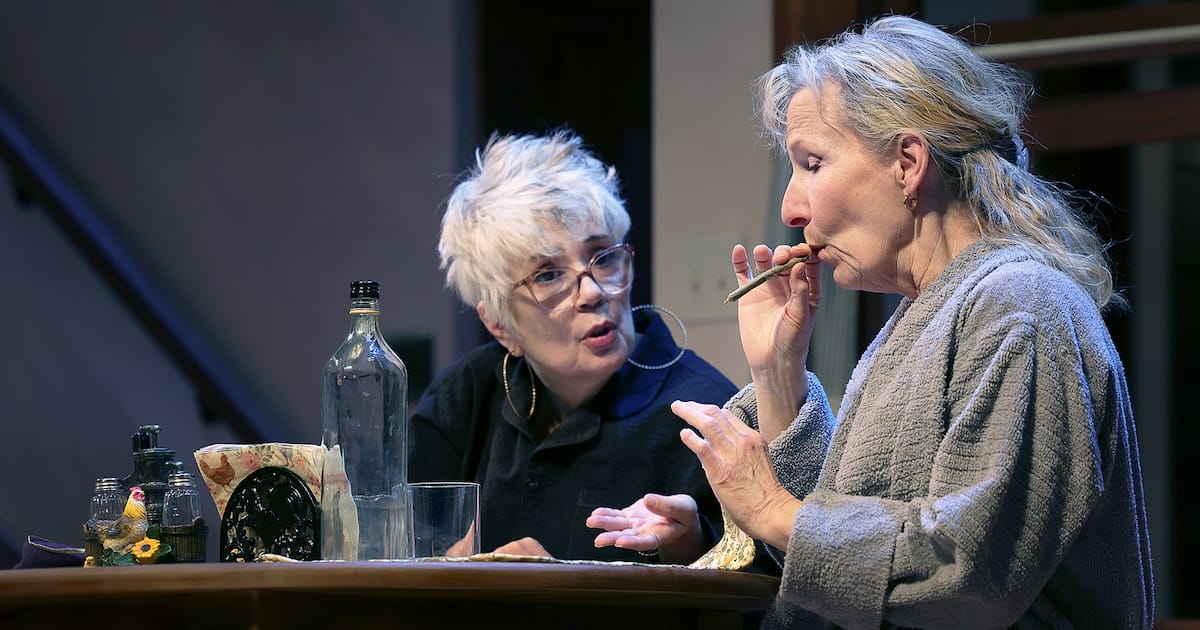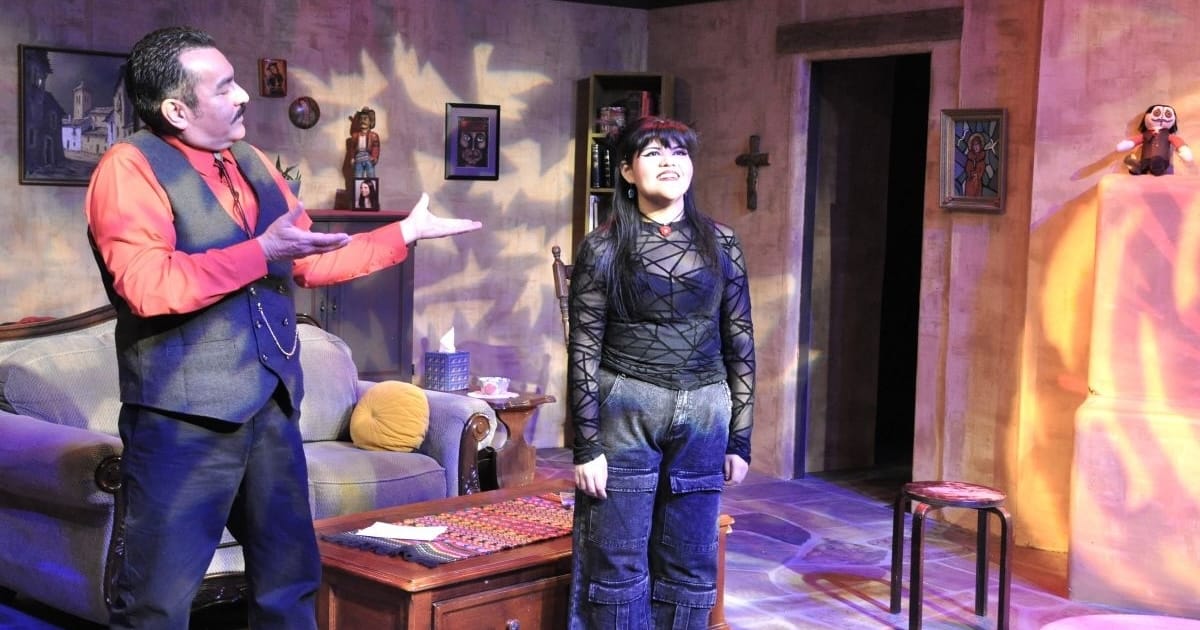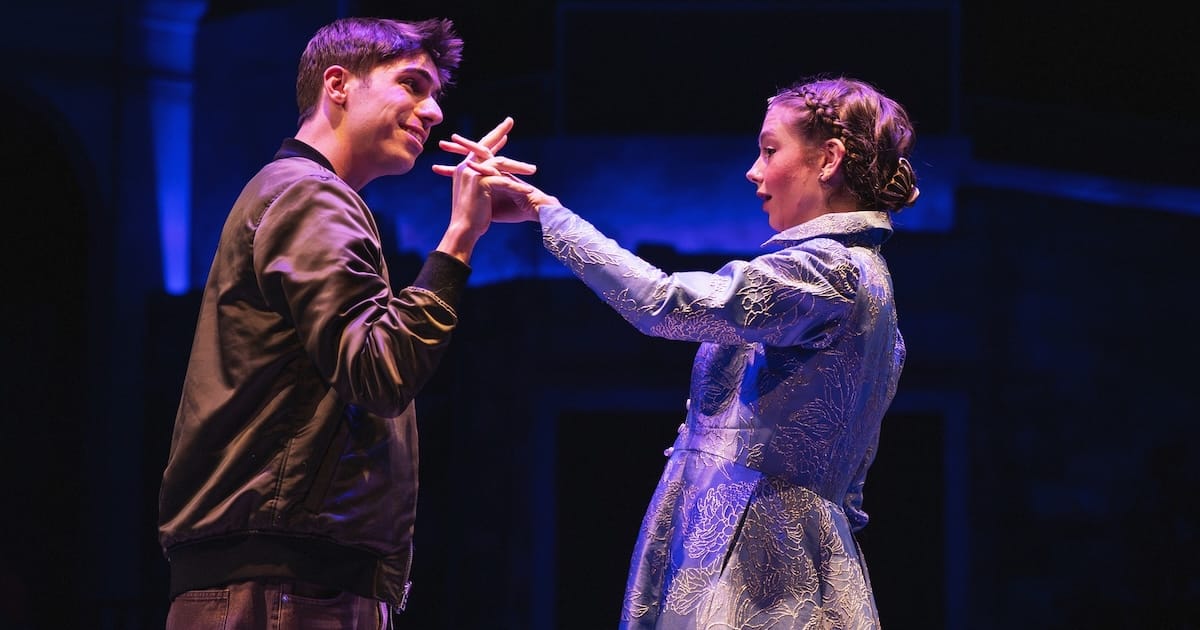Katori Hall’s play about Black masculinity is as touching as it is funny.
We were at the opening night of The Hot Wing King on May 2. It’s the final show of the 2024-2025 season for the Denver Center Theatre Company, and they went out with a bang. Here’s the transcript of our review, edited for clarity, which originally aired as a podcast episode:
Alex Miller: We are talking on May 3rd, the day after we saw the opening night of The Hot Wing King at the Denver Center. This is a Denver Center Theatre Company production. I guess this is their last one of the season, right?
Toni: That’s right. This is the final production of the DCPA Theatre Company’s 2024-2025 season.
Alex: So today’s podcast is just focusing on this one show review and we’ll be back next week with our regular slate of all the stuff we usually do on the podcast. So I would say just right off the bat, The Hot Wing King was a lot of fun. It’s a really well-done show.
So this is a play written by a woman, Katori Hall, about a bunch of guys. And so, I thought, you know, I was impressed by that. I thought she had a lot of great insight into masculinity. Of course, the cast are mostly gay Black men. There’s a couple of straight guys in there. So anyway, this runs through May 25th at the Kilstrom Theater, which is in the round — or in the pentagon — theater there. It’s about two and a half hours with an intermission directed by Timothy Douglas, who I think was last seen directing The Color Purple at DCPA.
Toni: Yeah, Timothy Douglas is quite familiar to audiences at the Denver Center. He’s done quite a bit of work there, as well as around the country. He’s a pretty accomplished director and he’s assembled quite a cast here, six very strong performers, all Black men, and it’s set around this cooking competition that these men are participating in. It’s really an exploration of masculinity and Black love.
Alex: Yeah, it is. The basic plot is that the character of Cordell is played by Terrence Archie is working on his recipe to win the Memphis Hot Wang Festival. And he’s recently relocated from … was it Seattle that he came from?
Toni: He’s left his family back in St. Louis for Dwayne.
Alex: St. Louis. Okay. So Dwayne’s a hotel manager, and it’s his house that we’re in. There’s this little sort of coterie of guys around. One of them is his barber, Big Charles, played by Tobias A. Young and another character named Isom, who is played by Isaiah Tyrelle Boyd, who is the comic relief. And boy is he, he is very, very funny. He’s just a live wire.
Toni: And super well-costumed. He’s got a bunch of different designer labels all over him. He’s got a Gucci bag that he’s very proud of. And like you said, he’s very much the comic relief of the play. We find out that he and Big Charles may have had a fling at one point, but Big Charles is not as into the commitment. He’s a football fan, so he’s much more focused on watching the game than relationships.
Alex: Absolutely, yeah. So yeah, so Isaiah Tyrelle Boyd was just so much fun to watch and his ass was almost like another character and he was very proud of it. He was shaking it all over the place.
Toni: Yeah, it’s very prominently featured in some very comic moments.
Alex: And so the other characters are Dwayne’s brother, TJ, Dayo Olatokun, and his son Everett, who’s played by Jacques Jean-Mary. Everything’s going pretty well, preparing for the festival, until TJ shows up with a bag of cash to Dwayne, saying, ‘Hey, my son may show up here,’ and indeed, Everett, referred to as EJ, does. And so that kind of sets off a whole lot of sturm und drang because Cordell is really not interested in having a child around to have to deal with because he’s left his family and his wife to be with Dwayne. So there’s all that stuff going on.

Terence Archie and Isaiah Tyrelle Body in ‘The Hot Wing King.’ | Photo: Jamie Kraus Photography
Toni: Yeah, it feels almost soap opera-esque because this moment that we’re dropped in on is the bubbling up of all of these family/personal tensions. Cordell is super conflicted because he’s left his family back in St. Louis. He’s not being super honest with his family or friends who he’s left behind about why he’s now in Memphis.
It’s interesting, Cordell doesn’t ever use the label of gay for himself, but he has left his heterosexual marriage to be in a relationship with a man. A lot of plays that focus on queer themes focus a lot on labels and identity, but this play has a much more fluid understanding of that, which is really refreshing to see and allows for a lot more complex character interactions. The fact that they’re queer and they’re in these relationships, that’s just treated very matter of fact. That’s not really the thing we’re exploring. We’re exploring how they feel as people about the situations that they’ve found themselves in.
For example, Cordell feels as if he has left a life in which, despite being in a loveless marriage, he had a lot of freedom to do whatever he wanted, and now he is unemployed. He’s moved to Tennessee for Dwayne, so all he has is this relationship, but Dwayne’s very busy working as a hotel manager and doesn’t exactly have time to stay at home and keep Cordell occupied all the time.
Alex: Yeah, exactly. Yeah, it really is interesting that the characters being gay is so matter-of-fact; their sexualities aren’t the play’s conflict but just part of its given circumstances. There’s a really compelling scene where the 16-year-old, EJ, has this conversation with Cordell about his past. He says, something like, “Why would you choose a ‘D’ over a ‘P?'” which leads to this interesting conversation about how he came to leave his family and wife to be with another man.
Toni: That conversation is really dynamic. It’s between Cordell and EJ and comes near the end of the first act. Dwayne has told EJ that he can live in this house. Dwayne says he just needs to talk to Cordell first, but rather than wait and let them have that conversation in private, EJ kind of springs this conversation on Cordell while they’re outside.
It starts with this exchange about, ‘Why did you leave your life behind?’ which is a very real, reasonable question to be asking, particularly if you’re a kid, and this is perhaps your first exposure to that. But then those questions get answered, and Cordell accuses EJ of having stolen some money in the past, and it blows up into this explosive conversation about their differences, and then EJ eventually storms off.
Alex: Wasn’t Dwayne sort of on the other side of the invisible wall?
Toni: Yes, he was. That was a particularly strong bit of staging by Douglas.
Alex: Agreed. Dwayne was doing things around the house, inside, while they’re in this space outside the house, talking about him. He was just kind of puttering around the kitchen. But yeah, that whole relationship starts to show some cracks when it comes down to how willing Cordell is to accommodate Dwayne’s family.
Toni: Cordell has left his family to start anew and wants to be here with Dwayne. He didn’t sign up to be a dad again, which is what he accuses Dwayne of asking him to do with EJ, because we learn that EJ’s mom has died. She was killed at the hands of the police, and both Dwayne and TJ blame themselves for the situation. However, while Dwayne is kind of stepping up and being more present in EJ’s life, TJ has stepped back and is not as present in EJ’s life.
Alex: Right. That relationship between TJ and his son, EJ, is really interesting. It starts out with you learning that TJ has been in and out of prison. He and EJ are always moving around because they keep getting evicted and TJ’s phone keeps getting turned off, but then that really evolves into something.
There’s a lot of character development with TJ throughout the show, and Jacques Jean-Mary, who plays EJ, I just love him. He’s such a great character. He starts out being this character who others accuse of stealing money, which he did, but later he’s like, ‘I only did that because I was hungry.’ EJ really wants to change his situation, and he realizes he can’t do it by staying with his dad.

Terence Archie and Tobias A. Young in ‘The Hot Wing King.’ | Photo: Jamie Kraus Photography
Toni: That journey EJ goes on is really powerful, as well as this parallel journey that TJ goes on, where he’s asking Dwayne, ‘Am I a good dad?’ It’s just a heartbreaking question because you see that, in TJ’s mind, he’s like, ‘I’ve been more present for my son than my dad or your parents ever were, why are you holding me to this unreal expectation that you didn’t even ever experience, Dwayne?’
I thought that was a great conversation, very powerfully acted and masterfully directed by Douglas. Speaking of, I’d like to transition into a conversation about the staging.
Alex: Let’s do it.
Toni: What Douglas is able to do in the round is superb. This house is center but also has additional rooms that either, come in from the side, like there’s a bed that’s clearly on this kind of rolling system so it can roll in and out of the scene, or remain on the sides of the stage throughout, like this shed and basketball hoop that create a convincing outdoor backyard area.
The staging was very fluid. There are often moments where scenes will be happening in one part of the stage, but there are other characters living in the background in other parts of the stage, which makes it incredibly visually engaging.
Alex: Yeah, so this set was by Tony Cisak, who has worked in this space with Rubicon and Choir Boy. It’s a really nice set. I will say one thing, it’s not necessarily a criticism, but at one point I looked up and I realized there were these four dormer windows at the top that seemed kind of superfluous. I don’t think they really added much to the set, but I guess if you looked up, you were like, ‘Okay, there’s the top of the house,’ but it was very nicely done, functional and there was a whole lot of in and out with all that stuff there.
The sound by Melanie Chen Cole was really solid, as well as the costumes by Rodrigo Muñoz. As you noted earlier, Isom had some really great ones, but they all did. They had these “Hot Wing King” shirts that they had at one point that were very funny.
Toni: Those shirts got a big laugh from the audience when they were revealed. The shirts looked like something Guy Fieri would wear on Diners, Drive-Ins, and Dives. It’s very loud with flames everywhere, but also a couple of sequins thrown in.
Alex: Yeah, and EJ was like, ‘Hey, I’m not wearing that.’ I have to say that by the time it ended, I had fallen in love with all of these characters. I just wanted to go give them all a hug. They just really told a great story, you know, and they might’ve been a little bit of unevenness between the high drama and the high comedy, I guess in places, but I don’t know. How did you feel about that?
Toni: Yeah, so this is a newer play, as you mentioned, written by Katori Hall. It premiered in February 2020, off-Broadway, right before the pandemic. It just made the cut. It had to end its run prematurely due to COVID-19 pandemic-related reasons; the production was eventually able to remount in 2022.
This script won the 2021 Pulitzer Prize for Drama, which is a pretty big deal, but I found that a little bit surprising after seeing the script in action on stage because I agree with what you said just a second ago: the script’s a little bit uneven.
There are really two stories going on. There’s this kind of hot wing battle in which they’re trying to prepare a spicy Cajun Alfredo wing with bourbon-infused bacon, and then there is this family drama, which we spent a lot of time already discussing.
I felt the family drama elements in this play felt a lot more organic and fleshed out than the competition aspect, which is mined largely for comedy, particularly in the second act after one of the characters adds an ungodly amount of spice to the wings and then the characters have to deal with the repercussions of that. But I oftentimes felt like when that plot started to kick into gear, I wanted to be like, ‘Stop the comedy for a second. We need to go back and focus on what that character just said.’ I wanted to sit in that moment for a little bit.
However, that’s not to say that the comedic moments weren’t well executed. There’s some hilarious milk-drinking gags done throughout the show, but those moments forced us to cut away from a really interesting exchange that was just getting started in another room, so that we could get back to the hot wing competition plot.
Alex: Right. I think there’s definitely something to be said there. It didn’t bother me a whole lot because I was enjoying all the gags so much. It’s always funny when somebody eats something really hot, and there are some pretty funny ones in here. It does have a little bit of a surprise ending in terms of who becomes the Hot Wing King, which we won’t reveal here, but yeah, overall this was a really great show. I enjoyed what it said about male relationships. It was interesting that a playwright was able to capture moments of sensitivity where these guys are letting their guard down and revealing their feelings, even if it’s somewhat reluctantly.
Toni: Those moments are the high points of the play for me, and all of those exchanges come in the more dramatic moments, but I was willing to go along with the comedy because the other elements are so strong, and I cared so much about these characters. By the end of the play, I was very much in the same place as you. I was like, ‘Damn, I wanna go grab a beer with these guys afterwards,’ and then just sit down, talk it out and be there for these characters.
Alex: Yeah. I will also say that one of the nice things about the Kilstrom Theater is you’re so close to the action. There’s not a bad seat in the house. I happened to be right by one of the entrances as they were going off, and I was just watching some of the actors going off who were so thrilled by the reception that they got. They got a really enthusiastic standing O, which they deserved. I thought that was really cool to see. In some of the scenes, it seemed like there were some genuine tears that the actors were kicking out.
Toni: Some genuine tears that the actors were whipping out, and there were some tears shed in the audience. Because the Kilstrom is so intimate, sound travels, and you can hear crying in the audience clearly as day, by the time we got into the third act, people were weeping in the crowd all around us.
Alex: Yeah. Yeah. I might have had to wipe my eye at one point. Cold shark that I am.
Toni: Look at you, Mr. Softy. I love it!
Alex: Okay. All right. Well, that’s our thoughts on The Hot Wing King. It’s a drama that’s very funny at the Kilstrom Theatre at the Denver Center. It runs through May 25th. And I think, yeah, very enthusiastic response from the crowd and us as well. Really a fun show to go see.
Toni: Yeah, maybe consider grabbing some hot wings before or after this show to make it a fully immersive experience.
Alex: Don’t forget your milk.
Toni: Good note, Alex.
Alex: All right, well, we will be back next week with our regularly scheduled bigger podcast. Until then, we’ll see you at the show!
Alex Miller is editor and publisher of OnStage Colorado. He has a long background in journalism, including stints as the top editor at the Vail Daily, Summit Daily News, Summit County Journal, Vail Trail and others. He’s also been an actor, director, playwright, artistic director and theatre board member and has been covering theatre in Colorado since 1995.
A Colorado-based arts reporter originally from Mineola, Texas, who writes about the changing world of theater and culture, with a focus on the financial realities of art production, emerging forms and arts leadership. He’s the Managing Editor of Bucket List Community Cafe, a contributor to Denver Westword and Estes Valley Voice, resident storyteller for the Bonfils-Stanton Foundation and co-host of the OnStage Colorado Podcast. He holds an MBA and an MA in Theatre & Performance Studies from CU Boulder, and his reporting and reviews combine business and artistic expertise.






Leave A Comment